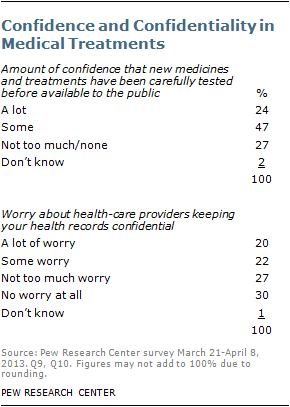
Before raising the topic of radical life extension, the Pew Research survey asked respondents about their opinions on medical advances in general. Overall, 63% of U.S. adults agree that medical advances that prolong life generally are good. About a third of U.S. adults (32%) say such advances are bad because they interfere with the natural cycle of life.

Opinions about medical advances in general are strongly associated with views about radical life extension in particular. About half (52%) of those who think medical advances that prolong life are generally good say that radical life extension would be a positive development for society, compared with just a quarter (25%) of those who consider medical advances bad because they interfere with the natural cycle of life.

The same pattern applies to personal desire for radical life-extending treatments. About half (49%) of those who think medical advances that prolong life are generally good say they personally would want radically life-extending treatments. By contrast, just a fifth of those who say medical advances are bad because they interfere with the natural cycle of life would opt for radical life-extending treatments.

The survey also asked a separate question about the costs and benefits of today’s medical treatments. A majority of adults (54%) say that medical treatments these days are “worth the costs because they allow people to live longer, better-quality lives,” while four-in-ten (41%) say such treatments “often create as many problems as they solve.”

Views about the costs and benefits of today’s medical treatments also are strongly related to opinions about radical life extension. Those who say medical treatments today are worth the costs are more inclined than those who see today’s medical treatments as creating as many problems as they solve to say that radical life-extending treatments would be a positive development for society (48% versus 33%).

The same pattern occurs with regard to preferences for life-extending treatments. Among those who say today’s medical treatments are worth the costs, nearly half (47%) say they would personally want radical life-extending treatments. This compares with just 27% among those who say that medical treatments today often create as many problems as they solve.
Medical Testing and Confidentiality Concerns

About a quarter of adults in the U.S. (24%) say they have a lot of confidence that new medicines and treatments have been carefully tested before being made available to the public. Roughly half (47%) have some confidence, and 27% have either not too much or no confidence that new medical treatments have been carefully tested.
Confidence in the testing of new treatments is modestly related to personal wishes for radical life extension. Adults who express a lot of confidence that new medicines are carefully tested are evenly divided in their assessments of radical life extension for society, while those who express less confidence in medical testing are more inclined to say that radical life extension would be a bad, rather than a good, thing for society. The same pattern occurs when it comes to personal preferences for radical life-extending treatments.
Personal concerns about the confidentiality of health records tend to vary, with a fifth of adults (20%) saying they worry a lot about health-care providers keeping their records confidential and another fifth (22%) saying they worry some about it. A majority of adults do not worry too much (27%) or at all (30%) about health-care providers keeping their records confidential.
Concerns about the confidentiality of health records are not significantly related to beliefs about the overall effect of radical life extension on society or personal preferences for receiving such treatments.




